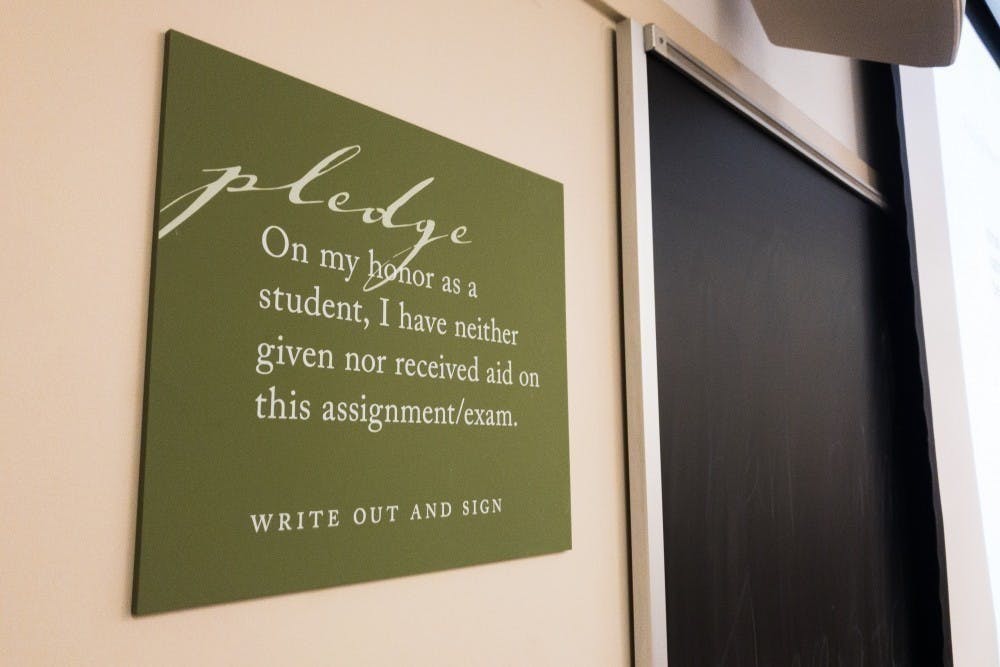The student elections this year include two amendments put forth by the Honor Committee — one regarding an annual Popular Assembly and Impeachment. Students at the University need to embrace the mantle of student self-governance. Honor as a democratic system requires steady and consistent input from the student body to improve and progress. In my personal view, Honor’s proposed amendments seek to encourage just that.
First, the Popular Assembly Amendment proposes that the event be an annual rather than biennial. The Popular Assembly provides students, faculty and organizations the opportunity to participate in the Honor system. It opens the system to questions, suggestions, debate, personalization and community input. However, as the Honor Constitution stands today, the Popular Assembly occurs only every second year. Some may ask what the importance of this amendment is, since the Committee meetings are always open to the public and often summarized in The Cavalier Daily. Why bind the Committee to making this effort when students could simply email their representatives when they have pressing ideas?
However, the burden lies on Honor to provide a venue for input that is accessible, that students know to look for and that gives students an opportunity to discuss Honor not only with representatives but with each other. Of course, the Honor system makes itself available to students through open meetings and outreach events — and regularly engages in those efforts — but an annual Popular Assembly would provide a particularly public forum that students could look forward to and expect. Through these organized events, the ideas and criticisms that students wish to see the Honor system face gain a platform and develop organization. Through the Popular Assembly, every student can participate, learn and contribute to a system that truly belongs to the student body. To constitutionally mandate such an event writes this democratic principle into the required actions of the Committee, ensuring that its commitment to self-governance remains not only an ideal but an active goal. The Committee proposed this amendment itself, demonstrating its willingness to invite students into this realm of self-governance.
The Impeachment Amendment, moreover, would allow the Committee to hold its members accountable. Whether for failure to meet minimum expectations as a representative or failure to uphold the standards of behavior expected from a Committee Representative, impeachment allows for strong action — it means that representatives can act if its quality falls short. Impeachment would allow the Committee to react to calls for action and to maintain its own integrity as a body. While we can all hope that impeachment will not be a measure frequently used, its passage would ensure a safeguard to the quality of student self-government. In further pursuance of that goal, the amendment also clarifies the process for recall elections. If the key to democratic governance is clarity of the law so that the people can act on the law, then this clarification serves to set before the student body a path to democratic action. With this amendment, students will know that they have two modes for dealing with unsatisfactory representatives — the new impeachment by the Committee provision, or a recall election with clear steps and criteria.
The cornerstone to this entire argument, however, is that a clear, fair and democratic result depends on students to vote on these amendments. The impeachment amendment passed the ballot last year with nearly 90 percent of student voters in favor, but failed to reach the required number of total votes. The Honor Committee’s Constitution mandates that amendments must pass by a margin of 60 percent, with 10 percent of the total student body voting in favor. Only 10.5 percent of the student body voted on the amendment at all, meaning that the minority who voted against the amendment swayed the outcome and caused the measure to fail. In other words, only about 9.5 percent of students voted in favor of the amendment, but that 9.5 percent made up 90 percent of participating voters. Clearly, overcoming the challenge of low voter turnout is vital to creating change and generating improvement in institutions like Honor. Overcoming the challenge is vital to the continuance of student self-governance.
Honor is more than simply the academic standard of our University. It is a commitment to the development of a community based on trust and on the values we choose for ourselves — honesty, integrity and generosity. The only way to choose those values is to participate in our democratic process. The people we elect and the changes we make have real impacts on our experience at the University. To vote in this election and to vote on these amendments is to understand that this University is not perfect, but that there is value in working together to improve it. Honor’s amendments deserve consideration — first as responses to democratic calls for improvement, and second as measures that make the Honor system of the future more accountable to each successive generation of students. In an environment where voter turnout trends low, every vote and every voice makes a particularly real impact. While I encourage you to support the annual Popular Assembly and Impeachment Amendments, regardless of your opinion — of Honor, self-governance or the amendments specifically — I encourage you to vote. After all, nothing changes in silence.
Mary Beth Barksdale is a fourth-year in the College, and is Vice Chair for Education on the Honor Committee and a representative of the College. This column reflects Barksdale’s personal opinion and not that of the Honor Committee or any other organization of which she is a part.







